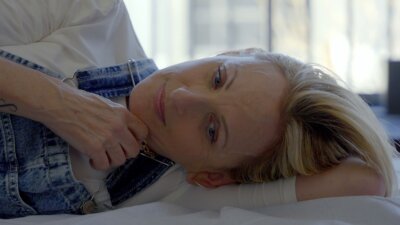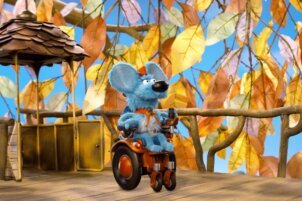
Courtesy of Sundance Institute.
“I became an advocate without knowing it at first. I was thrust into it, but that was okay.”
Marlee Matlin found herself as an advocate and role model early on in her career within the entertainment industry.
When Matlin starred in “Children of a Lesser God” in 1986, many other deaf individuals were finally seeing themselves reflected on screen. For example, Lauren Ridloff’s parents brought her to see the film when she was just 8 years old. Shoshannah Stern called Matlin “the first person I saw myself in.”
At the same time, when Matlin was nominated for an Oscar for her role, news coverage repeatedly said she would never have a starring role again because she is deaf. As a result, Matlin felt she had to prove that she belongs in Hollywood and was not just a sympathy vote. Even years later, when CODA was being made, there was a belief that Matlin is the only deaf actor out there.
“I have so much to give but I don’t want to do it alone,” Matlin says within the documentary “Marlee Matlin: Not Alone Anymore,” which delves into her life – from the public persona to behind closed doors.
Reflecting on her childhood, viewers learn that Matlin felt lonely at home due to the lack of communication within her family. This led to a rebellious stage at 15, which included using drugs. She later found herself a victim of domestic violence, but she lacked access to information that would have helped. Matlin shared that she would not overhear information from others, like the ability to call 911 for help.
What Matlin describes – from her childhood through young adulthood – is experiencing language deprivation. As she was growing up, students were pushed to speak in schools, with the belief that intelligence was based on the ability to speak. This led to the alienation of many deaf and hard of hearing individuals.
While later working within the entertainment industry, Matlin advocated for closed captioning, which enabled deaf and hard of hearing individuals to watch both news coverage and entertainment media. She also spoke out prominently while Gallaudet students pushed for a Deaf president.
In 1998, Matlin presented Michael Douglas with the Best Actor Oscar. While she began her presentation utilizing American Sign Language, she spoke using her voice when announcing the nominees. This was seen as controversial by many in the Deaf community, and Matlin stayed away from the Deaf community for 10-15 years after that.
However, Matlin could not stay away from being an advocate.
When she was asked by American Masters to do this documentary, she requested a Deaf director. “I threw up one name – Shoshannah Stern – and the rest is history,” Matlin shared during the Q&A following the film’s premiere at Sundance. “I felt it was time to tell my story. I knew that she would tell it 2000% in an authentic way, and it was.”
Stern recounted Matlin telling her she needed to direct when she was writing on her first TV show, “This Close.”
“I felt mixed emotions because I had never seen a Deaf director for TV or for film,” Stern said. “When you never see anyone who looks at you and they say you can write, how am I supposed to believe that? But Marlee has incredible instincts, because she’s had to navigate in a forest and make a path for herself, while I’ve been able to walk behind her and follow that path.”
In “Marlee Matlin: Not Alone Anymore,” Stern stressed the importance of being on camera with Matlin. She wanted to present a conversation, versus a one-way interview. This film not only showcases Matlin, but also Stern and others Matlin has mentored along the way.
In the film, Stern ensured that signing space was set up for all interviews. Many films featuring Deaf characters and cast members do not appropriately film and edit Deaf individuals. At the beginning of “Marlee Matlin: Not Alone Anymore,” Stern ensures the cameras are fully capturing all signing and shares that all voicing is for editing purposes; she did not want it married to the footage. This is something unique to a director who understands ASL. Similarly, Lauren Ridloff shares that Matlin provided direction on signing within the frame. She said it was the first time she received that feedback, calling it “illuminating.”
Overall, Stern’s goal is to make more space for more stories and more deaf creators.
“I wanted to make this film for Marlee, and also for me, and my younger self, and all Deaf children who are out there to see this, for them to have their own words to define how they feel and not what the world has decided they are,” she said.
“Marlee Matlin: Not Alone Anymore” premiered at the 2025 Sundance Film Festival as part of the U.S. Documentary Competition. In addition to screening in both Park City and Salt Lake City, this film was available online. All screenings included open captions. “Marlee Matlin: Not Alone Anymore” will next be screening at SXSW in Austin in March 2025.






